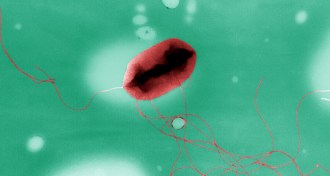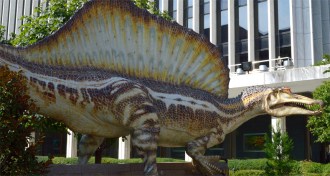All Stories
-
 Astronomy
AstronomyMystery of missing lithium extends beyond Milky Way
Stars in cluster Messier 54, part of a nearby dwarf galaxy, have just as little lithium as stars in the Milky Way, suggesting that the mystery of the missing element is universal.
-
 Quantum Physics
Quantum PhysicsArtificial atom probes sound’s quantum side
Scientists have designed an artificial atom to emit sound that is divided into quantum particles.
-
 Psychology
PsychologyPeople see own good but gossip about others’ misdeeds
Daily cellphone surveys probe the gap between the focus on personal virtue and negative chatter.
By Bruce Bower -
 Life
LifeVagina bacteria make molecules that could be drugs
Microbes on the human body are capable of producing thousands of small molecules that hold potential as drugs.
-
 Microbes
MicrobesVaccines and gut microbes join forces to fight flu
Losing gut microbes weakens the protective ability of the flu vaccine in mice.
By Nsikan Akpan -
 Neuroscience
NeuroscienceOur brains sort words as we sleep
Even after nodding off, a person’s brain correctly sorts words into categories, adding to the achievements of the sleeping brain.
-
 Earth
EarthWarming alone triggered Antarctic ice shelf collapse
Warming surface temperatures, not an unstable foundation, probably doomed Antarctica’s Larsen B ice shelf.
-
 Health & Medicine
Health & MedicineExperimental herpes drug outperforms first-line med
An experimental treatment for genital herpes suppresses the viral infection better than the standard drug, but animal tests raise concerns about side effects.
By Nathan Seppa -
 Paleontology
PaleontologyLost-and-found dinosaur thrived in water
Fossils pieced together through ridiculous luck reveal Spinosaurus to be the only known dinosaur adapted for regular ventures into water.
By Susan Milius -
 Life
LifeSuperslow sloths may have once evolved superfast
Sloths may evolved some of the fastest rates of body growth reported to date for mammals.
-
 Health & Medicine
Health & MedicineClinical trial reanalyses may alter who should get treated
Reanalyses of clinical trial data sometimes lead to different treatment suggestions.
-
 Paleontology
PaleontologyFossils push back origins of modern mammals
Fossils of three newly identified early mammals from China suggest that the common ancestor of today’s mammals lived over 200 million years ago.
By Meghan Rosen